One year on from the Prague Quadrennial in June 2011…
One year on from the Prague Quadrennial in June 2011 and one year closer to World Stage Design in September 2013 seemed like an appropriate time to start this blog.

SIX ACTS at Scenofest, PQ 2011 saw the culmination of a six month online research project with students and emerging practitioners from around the world. ACT 6 Wayfinding drew inspiration from the hawkers and street traders of Eugène Atget’s petit métiers series, to discover a contemporary scenographic and performance language with which to create 6 micro-street actions/exchanges that led the audiences to the acts and the acts to the audiences. Keen to use this opportunity to experiment with portable digital technologies we used Livescribe pens and Pogo portable printers to document these interactions.
OPEN STAGES – ROYAL SHAKESPEARE COMPANY (www.rsc.org.uk/explore/projects/open-stages)
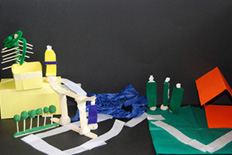
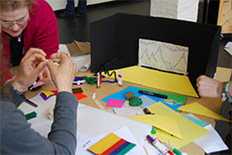
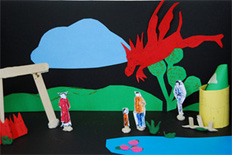
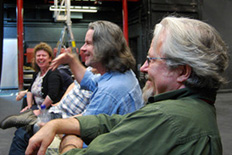
From the micro to the macro, Open Stages has been running for just over a year, delivering skills exchange workshops for around 3 000 members of community and amateur theatre companies throughout the country . Instigated by Artistic Director, Michael Boyd as part of the RSC’s contribution to the Cultural Olympiad, the project has moved and astonished us all. Most of these companies operate without anyone in the role of designer so it has been an enormous privilege to unlock our mysterious design process in 1.5 hour sessions that see people of all ages and no previous experience produce model boxes and storyboards that have regularly offered profound and revealing insights into texts I believed I was already very familiar with.

Particular thanks go to the amazing National Theatre of Scotland www.nationaltheatrescotland.com who chose to take this process one stage further by bringing representatives of all the Scottish community and amateur companies in Scotland together for a weekend of workshops on Macbeth in Glasgow. NTS moved 140 people around the city to different theatre and workshop spaces without losing anyone and really did engender a belief in the power of collective response by creating one of the most extraordinary chorus improvisations I have ever seen. This call to arms from Graham McLaren, Associate Director, to a group of people aged 11 to 80 to make ‘your national theatre’ as a result became tangible in the Open Space session that followed.
LEARNING TO LEARN
Creative Connections is the Royal Opera House’s intensive professional development programme for experienced artists from across a range of disciplines to harness their skills in working with communities and young people in the Thames Gateway. Based at their new Production Park facility in Purfleet, Essex, this process allowed us time and space to look at not just how we deliver but how we absorb new learning.
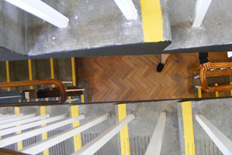
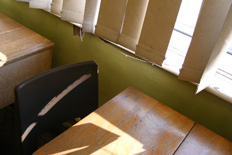
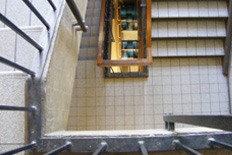
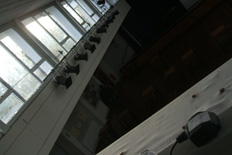
The project culminated in a series of triad collaborations between artists, teachers and members of staff from the Royal Opera House to create a new piece of work in a school.
Using the Grays Convent School building as site and instrument, our triad worked with Year 10 Fine Art students to inspire new stories and retell existing ones through open access to all areas of the building. The project culminated in an installation inspired by their photos and Sister Rita and Sister Rita, the founding nuns, who still live in the school grounds and who they met for the first time during the project.
COMING HOME
Though I have designed all over the UK and worked in Europe, opportunities to produce theatre in the area surrounding my studio are rare. This year’s FUSE Medway Festival fusefestival.org.uk provided an opportunity to bring live performance to the communities I have worked with here and for me to observe and reinterpret some of our local traditions within the design of WHATEVER FLOATS YOUR BOAT which toured to community parks and gardens as part of Lighting the Fuse. www.wowkent.co.uk/wow.theatre.html

WORLD STAGE DESIGN, CARDIFF 2013 (www.wsd2013.org)
Local traditions, customs and folklore are just one of the strands we are considering exploring as we start to put plans in place to bring practitioners from around the world together for World Stage Design in Cardiff in September 2013. Sustainability is one of the core themes for the event so I am curious to see what creative solutions we can find to sharing what we discover and discuss in Cardiff with practitioners who through reasons of cost and distance can not be physically present.
UK SCENOGRAPHY COMMISSIONER for OISTAT (International Organisation of Scenographers, Theatre Architects and Technicians)
I was delighted to be appointed to this role in December 2011. OISTAT www.oistat.org is an incredible, amorphous and inspiring organisation and I hope through the work I do on WSD and through SBTD www.theatredesign.org.uk I can raise awareness of what it has to offer, particularly for emerging practitioners whose involvement is key to its future sustainability.
